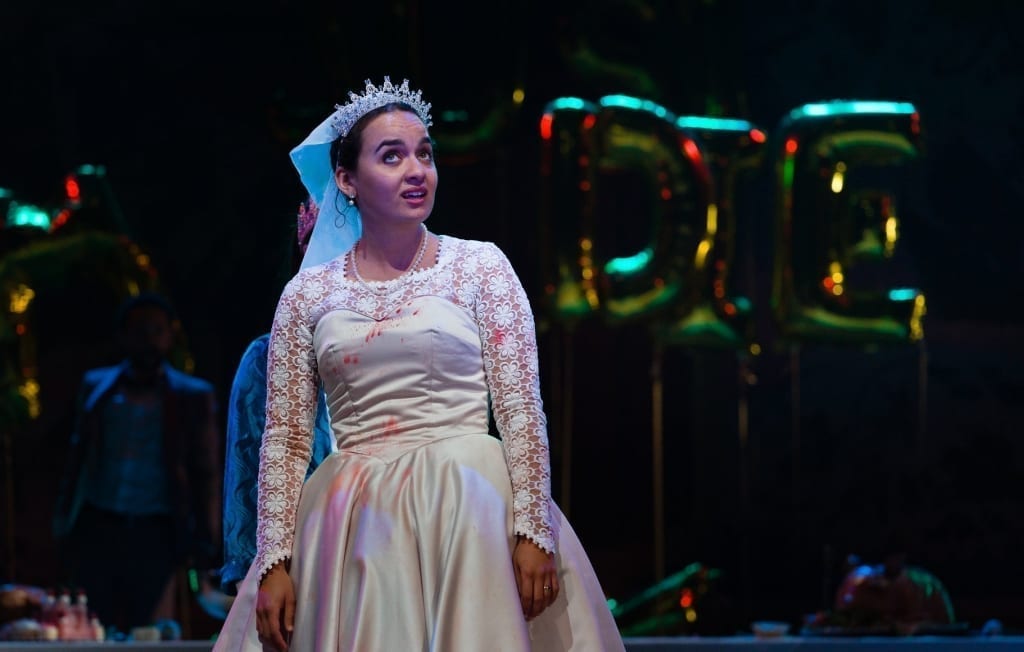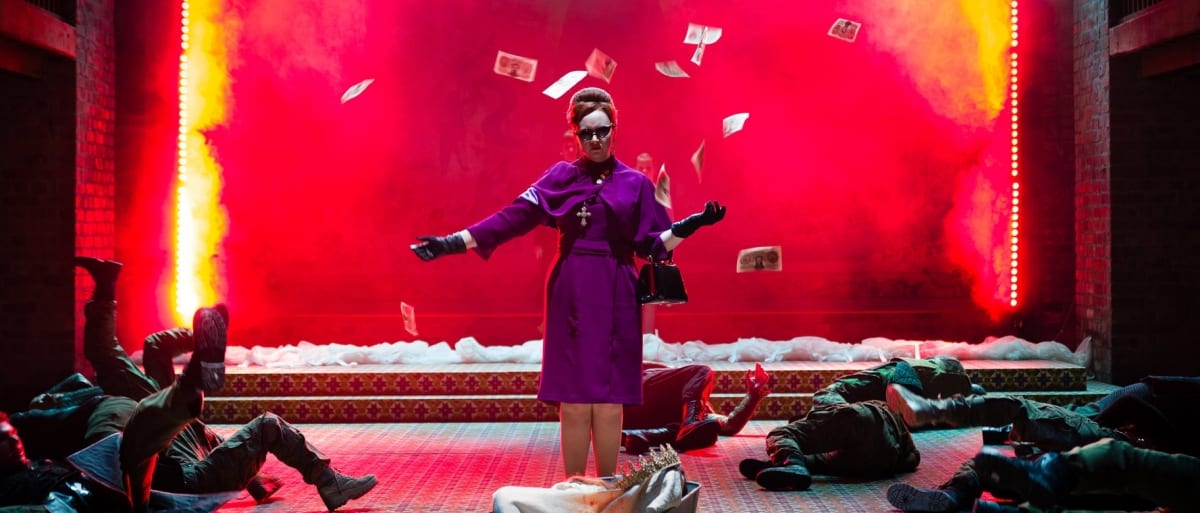Let me start by saying that the new production of Shakespeare’s too-infrequently produced play, King John, is entertaining, moving, engaging, utterly convincing and totally worth seeing. It is an excellent introduction to the text if you have never seen or read the play; and a production that really understands the complexity and also the theatrical energy of this drama.
The director, Eleanor Rhode, has a firm idea of the arch of the story this play tells and has created a production of complete clarity, much irony and humour and also, ultimately, pathos. The entire ensemble gives subtle and complex interpretations of the characters they are playing. The design by Max Johns is both witty and elegant, using as a scene-setting backdrop a fake yet evocative mediaeval tapestry of the tale, sort of King John the cartoon. This presents a fine contrast to the modern dress costumes suggesting both today and long ago simultaneously. There is an excellent, mood-enhancing score from Will Gregory, superbly played by the RSC band under Yshani Perinpanayagam, and everything from the lighting (Lizzi Powell) to the smoke is beautifully synchronised. Full marks also to Tom Jackson Greaves for the movement direction, and to Rachel Brown-Williams and Ruth Cooper-Brown for the especially striking fights and battles.

It is very clear from this intelligent production that King John is an underrated and underperformed play; Shakespeare has addressed universal and timeless themes of power, loyalty, volatile alliances and political realities that resonate with our own uncertain politics. What seemed to worry people in advance was the announcement that the roles of King John and Cardinal Pandulph, the Pope’s representative, were to be played by women. Some people are disturbed by that and argue, somewhat credibly, that certain aspects of interpretation of the male characters are not as convincing if played by a woman. Where is the testosterone? Where is the body language of a man?
But, I ask you, how is this so very different from the operatic convention where Cherubino is being played by a mezzo-soprano in The Marriage of Figaro, or Octavian is being played by a woman in Der Rosenkavalier? Perhaps this is just the establishment of a new theatrical convention or mode? How does it matter when we are used to the travesty roles in pantomime? Is an effeminate male King John any more valid than a woman playing this king? Yes, Glenda Jackson and Kathryn Hunter have been two of the most effective King Lear’s that I have ever experienced. We still somehow make the imaginative leap in the two operas mentioned and see these male characters as hormone enraged youths of great passion as the story tells us we should, and yet we are fully aware that they are being played by women. We allow Julius Caesar to be sung by a mezzo-soprano to get the right tessitura for a role originally written for a castrato. Rosie Sheehy is an utterly convincing King John. The power plays, favouritism, terrors, dirty tricks and lies work just as clearly as when John is played (as he was brilliantly once at the RSC) by someone like Guy Henry.

Like everyone on the stage in this production Rosie Sheehy reads her lines convincingly. She is quite simply a very fine actor and one to watch out for. Yes, perhaps there would be more to be made of the relationship with her powerful mother, Eleanor of Aquitaine (strongly characterized by Bridgitta Roy), if a man were playing the role. Meanwhile, Katherine Pearce’s brilliantly ironic, whip-smart and duplicitous Cardinal certainly conveys the major points of that role in the play and also the satire against the Catholic Church. It took me, oh, a whole thirty seconds or so to get used enough to these parts being played by women to do the necessary suspending of disbelief. And yes, I would now like to see another production where men take on these roles. But this is the production we have for the moment and this is an experiment that works; and it has made me want to re-read as well as re-see this play several more times.
Charlotte Randle was a suitably enraged Constance, protective of her young child and also fierce about her prerogatives; and Nadi Kemp-Sayfi was striking and complex as Blanche. Richard Pryal made a strong impression as Austria, and Brian Martin was a fine Dauphin. Tom McCall was a convincing, sympathetic and a suitably harrowed Hubert playing against Aaryan Dassaur, the night I attended, as a touching Arthur. The staging throughout was imaginative, especially moments like the death of Arthur. Finally, the star-making role of the Bastard, Philip Faulconbridge, was cheekily handled by Michael Abubakar and Zed Josef was striking in all his appearances, especially as Robert Faulconbridge, the legitimate son.
After this production, I am going to name-check Eleanor Rhode, Rosie Sheehy, Katherine Pearce and quite a lot of the cast to be sure to follow their work. This King John is a legitimate and thought-provoking interpretation as well as a very sound presentation of the play. It is definitely a winner.

